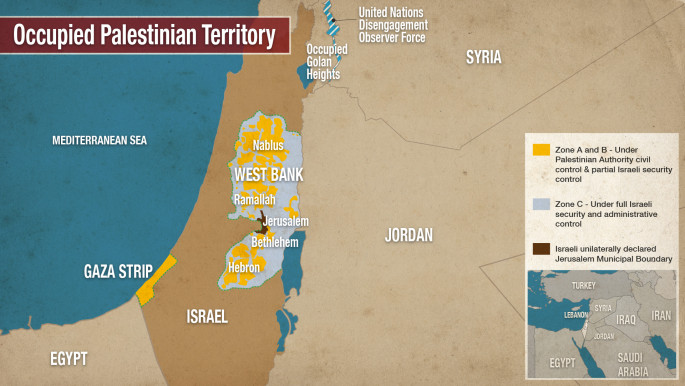Never mind the watchtowers, Palestine is no longer 'occupied' (according to Trump)
The 2018 Country Reports on Human Rights Practices refers to the Golan Heights, which Israel captured in 1967 and annexed in 1981, as "Israeli-controlled territory".
Netanyahu has been pushing for the United States and other countries to recognise Israeli sovereignty over the Golan, which it uses as a strategic buffer zone between itself and long-time adversary Syria. With the presence of Iran-backed militias in southern Syria, Israel has upped its military operations in the territory.
In a subsequent section on the Palestinian territories, the report did not use the words "occupied" or "occupation" to describe the West Bank or Gaza Strip, which were also seized by Israel in 1967. Although Israel ostensibly withdrew from Gaza in 2006, it still maintains a blockade on its land and sea borders, and frequently carries out military operations inside its borders.
Last year’s report dropped the "occupied territories" designation from the heading for the first time, but still referred to the West Bank and Golan Heights as "occupied" or "under occupation" within the text itself.
Twitter Post
|
A State Department source said on the report’s release: "Our policy on Golan has not changed. We retitled the HRR to refer to the commonly used geographic names of the area the report covers," according to Haaretz.
The sea change in geopolitical terminology comes just two days after Senator Lindsey Graham visited the Golan Heights and vowed to push for official US recognition of Israeli sovereignty over the territory.
Read more: Power play and wars of influence: What is the importance of the Golan Heights?
"The Golan is not disputed. It is in the hands of Israel and will always remain in the hands of Israel," Graham said from a cliff overlooking Syria, where Syrian flags could be seen fluttering in the distance on buildings damaged in the country's civil war. "My goal is to try to explain this to the administration," he said.
"Strategically, I am standing on one of the most important pieces of ground in the state of Israel, and who would you give it back to?" Graham asked, standing alongside Netanyahu and the US ambassador to Israel, David Friedman.
"You're going to give it to Assad? I think not. You might as well give it to Iran," Graham said, referring to Syrian President Bashar al-Assad, who is backed by Iran and Russia.
Syria responded to Graham’s remarks by condemning them “in the strongest terms”.
An official source from the foreign ministry said Graham’s statements “not only show ignorance of historical and geographical facts; it also shows the United States’ disregard and blatant violation of international law.”
This development comes as a precursor to the long-anticipated release of the US peace plan for the Middle East, led by Trump’s son-in-law Jared Kushner. The initiative has already been slammed as “dead in the water” for its outright neglect of the key Palestinian demands for peace.
The report also flies in the face of claims that US Ambassador to Israel David Friedman berated Knesset members last year for being “ungrateful” in demanding for official US recognition as Israeli.




